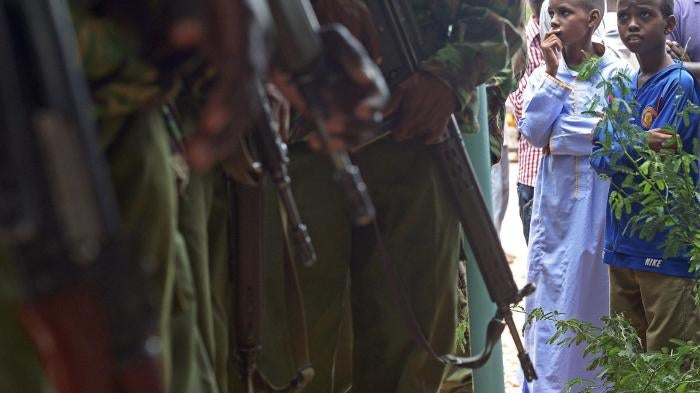Video: Kenyan Authorities Disappear People
Read a text description of this video
TEXT ON SCREEN
In April 2015, armed Islamist group Al Shabab attacked Garissa University College in northeastern Kenya killing 148 people. Al-Shabab has carried out dozens of other deadly attacks in Kenya in recent years. Kenyan authorities have cracked down and increased law enforcement operations, arresting many.
Adan, Brother of disappeared person:
Omar Yusuf was my older brother. On April 26 of last year, he was picked up by two men from the anti-terror police unit. This was the last time he was seen.
TEXT ON SCREEN
At least 34 people have been forcibly disappeared in Nairobi and northeastern Kenya in the last two years.
“Halima”, Relative of disappeared person
They did not tell me who they were but some of them were in plain clothes and some were dressed in police uniform. They put her in a Toyoto Probox, registration plate number KCC406Y and drove away with her. They said they were going to ask her questions and they would bring her back.
TEXT ON SCREEN
Counterterrorism operations have been marked by enforced disappearances, torture and arbitrary arrests.
Adan, Brother of disappeared person:
We don’t know whether he is alive or dead. There isn’t an office you can go to and enquire about him so it is very difficult.
“Halima”, Relative of disappeared person
They [the Pangani police] looked for her name in the incident book and said she was not on the list of people detained in that police station. They said they had not seen her. I also reported to Shauri Moyo police station. I told them of the date of her arrest and they said they hadn’t received any female detainees in their station on that date.
TEXT ON SCREEN
Kenyan authorities deny knowledge of the missing people’s whereabouts and refuse to acknowledge growing evidence of abuses by security forces.
Adan, Brother of disappeared person:
We are asking the government to produce him in court and charge him if he has committed a crime.
“Halima”, Relative of disappeared person
She has been disappeared in her own country. The government is silent about her whereabouts. No one knows whether she is dead or alive.
SCROLL OF NAMES OF THOSE MISSING
TEXT ON SCREEN
The Kenyan government should urgently provide information on the whereabouts of the disappeared people. Anyone in detention should be charged or released.
Kenyan security forces have forcibly disappeared at least 34 people in the past two years during abusive counterterrorism operations in Nairobi and in northeastern Kenya. The military was actively involved in raiding homes and compounds to arrest people who were allegedly suspected of links with the armed Islamist group, Al-Shabab. But months, and in some cases over a year, later, suspects have not been charged with any crimes and families cannot locate them. In each case, although families reported the disappearance to the police and sought help from various authorities, the authorities failed to inform them of the detainees’ whereabouts or to properly investigate allegations of abuse.
Concern for the well-being of the 34 people is compounded by at least 11 cases in the past two years in which dead bodies of people previously arrested by state agents have been found, in some instances far from the location of their arrest. As far as Human Rights Watch is aware, police have not meaningfully investigated these deaths. In one instance, a body was exhumed in Mandera in response to public demands, but the government has not conducted an inquest or any meaningful investigations as required by Kenyan law.
Government action to address abuses in counterterrorism operations is long overdue. The government should provide basic information regarding the identities, fate, and whereabouts of people arrested in these operations, and ensure basic due process rights for anyone who is arrested or in custody. The Kenyan police and military should urgently investigate allegations of disappearances, deaths and torture in the northeast, and bring those responsible to justice. The president should establish a special commission of inquiry to investigate and establish the extent of the abuses in Kenya’s counterterrorism operations.

